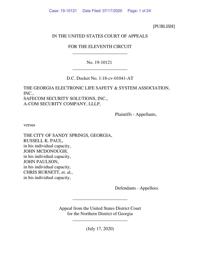
7.20.21 – Northside Neighbor = By Everett Catts @NeighborEverett
Click here to download the opinion
Updated
This article was updated July 21 at 12:12 p.m. with information and quotes from the Security Industry Alarm Coalition and the Georgia Electronic Life Safety & System Association Inc. added.
The city of Sandy Springs has won the latest battle in an ongoing legal war between it and a trade organization regarding its amended alarm ordinance.
The city July 20 announced a panel of three judges from the U.S. Court of Appeals’ Eleventh Circuit in Atlanta ruled in the city’s favor.
In their ruling, Senior Judge Barbara J. Rothstein and Judges R. Lanier Anderson III and Stanley Marcus wrote the city’s alarm ordinance is “rationally related to the city’s strong interests in reducing the number of false alarms that heavily burden its police and fire departments and wastes public resources.”
Georgia Electronic Life Safety & System Association Inc., a trade organization, plus Safecom Security Solutions Inc. and Acom Security Co. LLP, sued the city in March 2018.
The city revised its ordinance in September 2017, because the model ordinance recommended by the alarm association and implemented by the city in 2013 proved to have no substantial impact in reducing the number of false alarms. In 2017, there were 9,802 calls to the 911 center by alarm companies with 99 percent of those false alarms.
The city also amended the ordinance again in June 2018, requiring alarm companies to provide true, confirmed verification through audio, video or in-person confirmation on intrusion (burglar) alarm activations before calling 911. That change took effect a year later to give alarm companies time to adjust.
In the lawsuit, the alarm companies and the association claimed the ordinance violated their constitutional rights by fining the alarm companies for the false alarms they reported to 911 on behalf of their customers. The city maintains it is trying to resolve a public safety crisis created by the alarm industry.
In its ruling, the Eleventh Circuit Court wrote the ordinance is an economic regulation that “does not burden any suspect classification or fundamental right.” The court also upheld the city’s appeal process for false alarms, citing the alarm industry failed to prove harm because the companies never attempted an appeal.
“False alarms have, for decades, placed a strain on public safety resources,” Sandy Springs Mayor Rusty Paul said in a news release. “We are pleased that the appellate court recognized our efforts to provide a fair and reasonable solution to curb this waste on public safety efforts.”
In December 2018, the U.S. District Court dismissed the lawsuit and it was then appealed. The court opinion found substantive due process and legitimate governmental reasons for the ordinance and a rational basis for the city to believe the law furthers a legitimate purpose.
Since true verification took effect in June 2019, the 911 call center has received only 1,645 intrusion, panic or duress calls from alarm companies, with more than 99% of them remaining false alarms.
In a news release, the businesses involved in filing the lawsuit, including the Security Industry Alarm Coalition, a Frisco, Texas-based national organization that organized the suit and paid the legal fees, said they were disappointed in the judges’ ruling.
“The court reasoned that alarm companies could educate their customers, pass along fines, or stop serving chronic abusers and that it does not violate due process to hold them vicariously liable for the misconduct of their customers,” the release stated.
Stan Martin, the coalition’s executive director, added, “Even after it started fining alarm companies, Sandy Springs continued to impose additional punitive measures on the 80% of the community that depends on alarm systems to protect life and property. The Sandy Springs ordinance is also among the most punitive in the nation with excessive fines, even when a dispatch is cancelled and the requirement of some type of verification before police will be dispatched.”
The release also stated that since the ordinance went into effect, alarm companies have been forced to pay tens of thousands of dollars in civil penalties for the actions of alarm users who have caused “false alarms” as determined by Sandy Springs and billed by Cry Wolf Services, the city’s third-party alarm administrator.
“While we are disappointed in the court’s ruling, we are pleased that other cities have shown little interest in Sandy Springs’ vindictive approach to our industry,” Scott Hightower, the association’s president, said.
David Margulies, a spokesman for the coalition, said the parties that filed the lawsuit are considering asking for a hearing with the Eleventh Circuit’s entire panel of judges and will decide whether or not to appeal the case to the U.S. Supreme Court after that hearing, if they request it.
